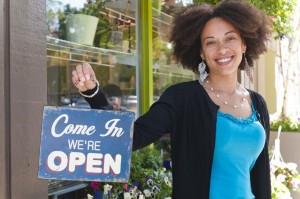(ThyBlackMan.com) A Minority Business Enterprise (MBE) by definition is a business owned by an American citizen who belongs to an ethnic minority. It provides products or service in high demand by that minority group.
Ethnic groups include African Americans and Native Americans. They include West Asian Americans from places like India or Pakistan; East Asian Americans from places like Japan or Korea; Hispanic Americans from Latin America and South America, as well as from Portugal and Spain. They may also include groups like Service-Disabled Veteran Owned a.k.a. SDVBE.
Since these are niche businesses, they often provide products rather than services, and these products appeal to their own ethnic group. Since they are dealing with products, they often own small stores in ethnically concentrated neighborhoods. A shop in Stockton Street, San Francisco, for instance, may sell Chinese books, magazines, and specialty teas to appeal to the interests of the local Chinese population.
However, these MBE businesses are now experiencing a crisis because their business model is being replaced by a consumer preference for online shopping.
While many MBEs are struggling to stay in business, a few, like LumiBloom, which specializes in hair products, have been adaptive enough to the changing times. By depending on a sales force working as hair party hostesses and having products shipped from an e-commerce site rather than stocked in stores, they bypass the risks typically connected with the traditional retail model.
The Unrecognized Crisis in Retail
The reason more MBEs are not switching to an online business is because they don’t understand that there is a crisis in the retail industry. Instead, they perceive antithetical social causes as the reason for their economic struggles. For instance, the current outbreak of bigotry and racism attributed to Islamophobia or an apparent increase in smash and grab robberies covered in the news.
Why Online Retail is Flourishing
Here are two recent business trends in regard to the online retail industry:
1. E-commerce stores are doing all the right things to attract more customers.
- Online retailers have won consumer confidence through detailed product descriptions and photographs on their websites, encrypted payment processors, fast drop shipping, excellent customer service by telephone or email, and relationship building via social media fan pages.
- Online retailers don’t have to spend money on physical stores and can pass the savings on to consumers. So a consumer product could be cheaper online than offline.
- Online retailers have realized that consumers may not buy because they don’t want to pay shipping costs, so many are now providing free shipping if consumers spend a certain dollar amount. Although online retailers are now paying for delivery out of their own pockets, they are making up for their costs by getting a higher volume of sales.
2. Consumers find shopping online easier.
- 1. Consumers have little leisure time to go shopping because of the higher cost of living many are forced to work long hours at a corporate job or they may work 2 to 3 jobs to pay the bills.
- 2. Consumers find it easier to do price comparisons using advanced search features across multiple stores and within stores. This is so much easier than going through the aisles in a store trying to find something or discovering after a purchase that the same product could have been bought cheaper at another store a few blocks away.
- 3. Consumers can shop through a variety of devices. They don’t have to rely on a desktop or laptop, but can shop just as easily on a tablet or mobile phone.
- 4. Consumers don’t have to worry about time or location when shopping. A consumer can shop at any time and buy from any place in the world.
How MBE Stores Can Adapt To Change
Here are 4 simple strategies that minority retailers should consider adopting.
- 1. Quit attributing their decline in business to personal, racial, or social agendas. The main reason their business is declining is because people prefer to shop online.
- 2. Create sales groups paid on commission for products that need to be sampled or tried out.
- 3. Turn most of the store into a fulfillment center.
- 4. Make the in-store experience more like a cultural hubspot than a retail outlet. An Indian grocery store could have classes in cooking Indian cuisine or a Chinese store that sells books and magazines could have a Chinese calligraphy class.
The Primary Reason For Low Passerby Traffic
While political and sociological factors can’t be ruled out as the reason for the struggles faced by MBEs, the biggest threat to their business isn’t a decline of interest in hair weave pieces or exotic spices or native-language magazines, but a preference for buying products from home using the reach of the Internet.
Staff Writer; Derrick Page

















Leave a Reply